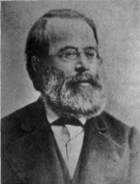
1815-1904
Otto von Boehtlingk, one of the greatest 19th century Indologists, is best known for the compilation of the monumental St. Petersburg Sanskrit dictionary. He also made Panini accessible to Western scholars. He also has some masterly text editions to his credit.
Otto von Boehtlingk was born on 11.6.1815 in St. Petersburg, he came from a Luebeck family that had acquired Dutch citizenship. Boehtlingk attended a German school in St. Petersburg and continued his university studies there. He later went to Bonn and Berlin where he studied with Bopp and A.W. von Schlegel. In 1842, Boehtlingk was appointed a member of the Imperial Academy of Sciences in St. Petersburg. In later years he was its honorary member. He held this post during his lifetime and this enabled him to devote all his time to scholarly pursuits without being bound by other official duties. In 1868 he went to Jena and later in 1885, he moved to Leipzig where he died on 1.4.1904.
Boehtlingk's first publication was Panini's acht Buecher grammatischer Regeln ("Panini's eight books of grammatical rules”). The first volume appeared in 1839. It contained Panini's sutras with Indian commentaries. The second volume, published in 1840 contained the introduction, explanatory motes and indices. A second edition appeared in 1887 with a shorter introduction and commentary. However, each sutra was accompanied by a German translation and notes. Boehtlingk added the Dhatupatha and "Panini's vocabulary" to the indices. According to Boehtlingk, Panini lived around 350 B.C., Katyayana around 250, and Patanjali around 150 B.C. The original edition was reprinted in 1983.
Vopadeva's Mugdhabodha, a 13th century grammarian's work, appeared in 1847: The edition is accompanied by explanations and indices. Three papers published in the Memoirs of the Imperial Academy of St. Petersburg in 1848 were the preliminary studies for the Sanskrit grammar he intended to write. The papers were, Ein erster Versuch ueber den Accent im Sanskrit ("First attempt on the accent in Sanskrit"), Die Deklination im Sanskrit ("Declination in Sanskrit"), and Die Unadi Affixe ("The Unadi affixes"). Boehtlingk was the first to give a specimen of the original accentuation in the Rigveda. This problem had not been taken note of by earlier scholars.
Boehtlingk wrote a treatise Ueber die Sprache der Jakuten ("On th language of the Jakuts"), which first appeared in volume III of Dr. A. Th. von Middendorfs Reise in den aessersten Norden und Osten Sibiriens ("Dr. A Th. von Middendorfs journey to the extreme North and East of Siberia") St. Petersburg 1851. This treatise was considered an important contribution to general linguistics.
Boehtlingk edited and translated two Sanskrit dramas, Kalidasa's Ring Cakuntala, Bonn 1842, and Mricchakatika, d.i. das Irdene Waegelchen St. Petersburg 1877. He also published an anthology of Sanskrit texts Chrestomatie, 1845, second edition 1877, third (by Garbe) 1907. He edited the Chandogya Upanishad, 1889, and Dandin's Kavyadarsa, 1890 together with German translations.
The Sanskrit Dictionary of the Imperial Academy of Sciences by Otto Boehtlingk and Rudolph von Roth, St. Petersburg, appeared between 1852-1875. It has 9478 large quart pages printed in two columns. A large number of passages from Sanskrit literature illustrate the meaning of the entries. Rudolph von Roth was responsible for Vedic literature while Boehtlingk was responsible for classical literature. Boehtlingk's share is estimated to be 90% of the whole work. W.D. Whitney contributed the word index to the Atharvaveda, A. Weber the index to ritual literature and A.F. Stenzler the index to Manu. A number of texts were quoted from manuscripts. It was due to Boehtlingk's untiring perseverance that the dictionary could be completed in 23 years. The Petersburg Dictionary has been an indispensable tool for Indologists. An English translation has been prepared in India.
After the dictionary had been completed, Boehtlingk immediately started work on an abridged version for beginners. He revised some parts and gave entirely different quotations from literature as examples for the entries.
Boehtlingk's Indische Sprueche, Sanskrit und Deutsch, a collection ol short epigrammatic verses, appeared in St. Petersburg 1863-65. It was an offshoot of his work on the dictionary. The revised edition of 1870-73 was reprinted in 1966. During the last years of his life, Boehtlingk mostly wrote on Vedic passages, attempting to emendate and explain doubtful verses in the Veda. He was active until the end and wrote a small Vedic article on his deathbed.
A bibliography of Boehtlingk's works was compiled by K. Salemann and S. v. Oldenburg in Melanges Asiatiques, 1892."....the first translations of Jain sources into German date back to the middle of the nineteenth Century when Otto von Boehtlingk published a German Version of Hemacandra's Abhidanacintamani (1848)." [Dr.M.R.Gelra in Science In Jainism - 7.01 - Contribution Of German Scholars To Jain Studies (1) ]